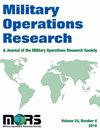基于相似性选择索引的顺序学习
IF 0.7
4区 管理学
Q3 Engineering
引用次数: 1
摘要
在大规模仿真优化中,不可能详尽地模拟每一个选择。然而,选择之间通常存在固有的相似性:例如,模拟模型的两组相似的输入设置可以合理地预期产生相似的输出。因此,从模拟一个选择中获得的信息可以用来推断其他类似选择的值,从而从相对较少的样本中学习更多。Zhou、Fu和Ryzhov的论文《具有相似度选择指数的顺序学习》(Sequential Learning with a Similarity Selection Index)开发了一种新的相似度模型,以改进所有样本收集后的最终选择决策。新的“相似度指数”是对所有现有信息收集程序的补充,这些程序不关注最终决定。同时,新模型允许对最优过程进行易于处理的理论处理,可以有效地逼近。本文章由计算机程序翻译,如有差异,请以英文原文为准。
Sequential Learning with a Similarity Selection Index
In large-scale simulation optimization, it is impossible to exhaustively simulate every choice. However, there are often inherent similarities between choices: for example, two similar sets of input settings to a simulation model can reasonably be expected to produce similar output. The information gained from simulating one choice can thus be used to infer the values of other similar choices, enabling learning more from a relatively small number of samples. The paper “Sequential Learning with a Similarity Selection Index,” by Zhou, Fu, and Ryzhov, develops a new similarity model to improve the final selection decision after all samples have been collected. The new “similarity indices” are complementary to all existing information collection procedures, which do not focus on the final decision. At the same time, the new model allows a tractable theoretical treatment of an optimal procedure, which can be efficiently approximated.
求助全文
通过发布文献求助,成功后即可免费获取论文全文。
去求助
来源期刊

Military Operations Research
管理科学-运筹学与管理科学
CiteScore
1.00
自引率
0.00%
发文量
0
审稿时长
>12 weeks
期刊介绍:
Military Operations Research is a peer-reviewed journal of high academic quality. The Journal publishes articles that describe operations research (OR) methodologies and theories used in key military and national security applications. Of particular interest are papers that present: Case studies showing innovative OR applications Apply OR to major policy issues Introduce interesting new problems areas Highlight education issues Document the history of military and national security OR.
 求助内容:
求助内容: 应助结果提醒方式:
应助结果提醒方式:


